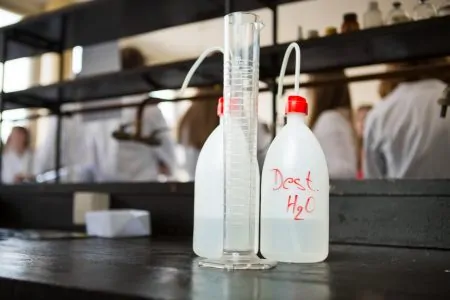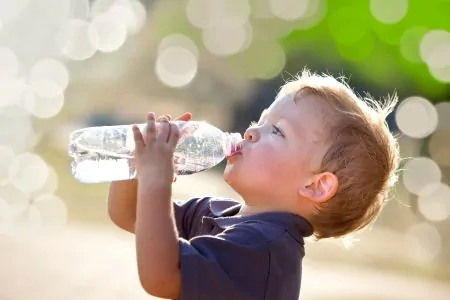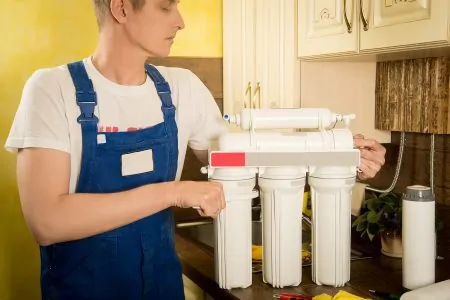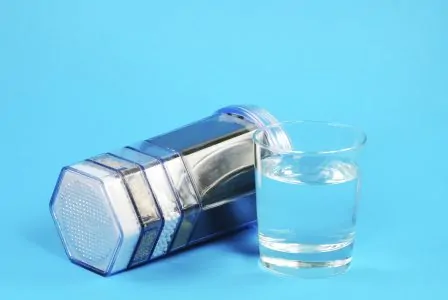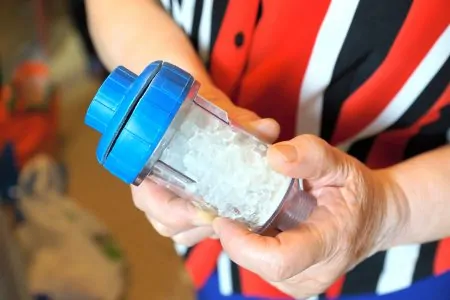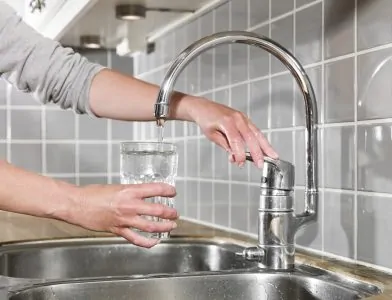For thousands of years, people have been attempting to make their water cleaner. One of the oldest and most effective ways to separate water from contaminants is by distilling it.
You have probably heard of distillation but you might not be familiar with the process itself. More importantly, you might also be wondering whether or not you can drink distilled water safely.
In this article, we will explain what distilled water is and how it is created. Then, we will explore whether or not distilled water is good for you, to help you decide if the process is suitable for your drinking water.
Key Takeaways
- Distilled water is created by boiling water, collecting the steam, and allowing it to condense back into a liquid, removing all mineral content and impurities.
- Drinking distilled water can reduce the risk of waterborne diseases and reduce consumption of chemicals found in tap water.
- Distilled water may have a flat taste and lacks essential minerals, which can lead to imbalances in the body if not consumed through other sources.
- It is safe to drink distilled water as long as you maintain a balanced diet to ensure your body receives necessary nutrients.
What is Distilled Water?
Distilled water has had all its mineral content removed as well as sediment (1). This is achieved by boiling the water, collecting the steam, and allowing it to return to a liquid state via condensation (2). Any impurities are left behind, creating water that is free from microbes and minerals.
Filtering water removes microbes but leaves the mineral content where it is. Spring water is a natural example of this, as it is filtered by the rocks it flows past.
Pure water, with the exception of distilled water, is processed in two ways. The first is via reverse osmosis — filtering the water through a semipermeable membrane to remove salt and impurities (3). This is one way of desalinating seawater for human consumption (4).
The second is deionization. This removes salt and other minerals from water by using two ion exchange materials (5).
Many people have turned to bottled water as an alternative to tap water, concerned about what it could contain. Research indicates that the average annual consumption of bottled water in the United States has risen from 16 gallons to 42 gallons per person from 1999 to 2017 (6).
Benefits of Drinking Distilled Water
Distillation is one of the oldest and most reliable ways of purifying water. The potential advantages of drinking distilled water include:
1. Reduce the Risk of Waterborne Diseases
Bacteria, viruses, and other dangerous microbes that live in water are left behind when it is distilled. This makes the water safer and reduces the chance of illness.
2. Reduces Consumption of Chemicals
The amount of chemicals that are allowed in drinking water is determined by the US Environmental Protection Agency (EPA) (7). The EPA has zero-tolerance for carcinogenic chemicals or microbial contaminants, such as bacteria and viruses. However, many other chemicals are assessed and limited based on how they affect health.
As such, your water supply could still contain chemicals. In contrast, distilled water has had them all removed. This means that, depending on the quality of your municipal water supply, distilled water could be better for you.
Disadvantages of Drinking Distilled Water
Distilled water might be purer than tap water, but that doesn’t necessarily mean it is a better method of hydrating your body. Some of the possible disadvantages include:
1. Lack of Taste
When water has all its mineral content removed, it can be left with a flat taste. If water doesn’t taste as good, you might drink less of it, increasing the risk of dehydration.
2. Impaired Metabolism
Calcium and magnesium play important roles in keeping our bodies functioning correctly (8). These minerals and others come from our diet and drinking water. If you don’t get them from other sources and you drink distilled water, you might not be consuming enough.
While drinking distilled water won’t kill you, if you have a serious mineral deficiency, it could lead to osteoporosis, diabetes, or cardiovascular disease. (9).
3. No Mineral Replacement
Our bodies release water and minerals when we sweat or urinate (10). To ensure the body still works as it should, these must be replaced.
As distilled water has no mineral content, it can’t replace those we lose naturally. Still, by consuming a varied diet, these minerals and salts can still be replaced.
Be Aware
Fasting and then only drinking distilled water could be dangerous. Your body won’t receive the nutrition it usually gets from a balanced diet.
4. Changes to Mineral, Electrolyte, and pH Levels of Tissues and Blood
Drinking distilled water without a balanced diet can alter the levels of electrolytes, minerals, and pH levels in your body.
The pH of distilled water is lower than that of tap water or mineral water, making it more acidic (11). While the pH is 7 immediately after distillation, it absorbs carbon dioxide from the atmosphere, bringing the pH to around 5.8 a few hours later. Combined with a lack of minerals and electrolytes, this can upset the balance of nutrients in the body (12).
These imbalances can affect fluid retention and cause muscle cramps, fatigue, headaches, and a disrupted heart rate (13).
Not only distilled water can do this. Water that is desalinated, nano-filtered, deionized, or purified with reverse osmosis, and not remineralized, can upset the body’s balance.
5. Environmental Effects
Distillation leaves behind water that is high in salinity or limescale. This water can affect the ecosystem around it.
6. Possible Contamination
Although distilled water is very pure, it can be contaminated by minerals and chemicals from its container. This is is most common with a plastic container, particularly in warm areas (14).
The molecules comprising the plastic react to the heat and leak into the water. One of the most notorious of these chemicals is bisphenol A (BPA) (15). It can negatively affect the health of unborn fetuses and alter the behavior of children.
With that said, the US Food and Drug Agency (FDA) regulates the production of bottled water, including its packaging (16). Although some chemicals and minerals might find their way into your distilled water, they won’t be at harmful levels.
What is Distilled Water Used For?
Due to the lack of minerals in distilled water, it has many uses other than drinking. For example, it can be used in an aquarium, to fill your steam iron, or to water your indoor plants. It is also used in the cooling systems of cars and to top up their batteries.
Some medical devices, such as a CPAP (continuous positive airway pressure) device, use distilled water. This helps prevent interference with the results of tests that can be caused by the mineral content of standard water.
FAQs
Can You Drink Distilled Water?
In short, yes, you can drink distilled water. However, it is important that you also consume a healthy, balanced diet, so your body still receives all the nutrients it needs.
There are some other factors to keep in mind when considering distilled water. These include the quality of your municipal water supply, whether or not you like the taste, and how much it would cost you to switch to drinking distilled water instead.
Distillation is not a cheap way of achieving purer water, but it is one of the most reliable. If you want the cleanest water possible, it is one to consider.
